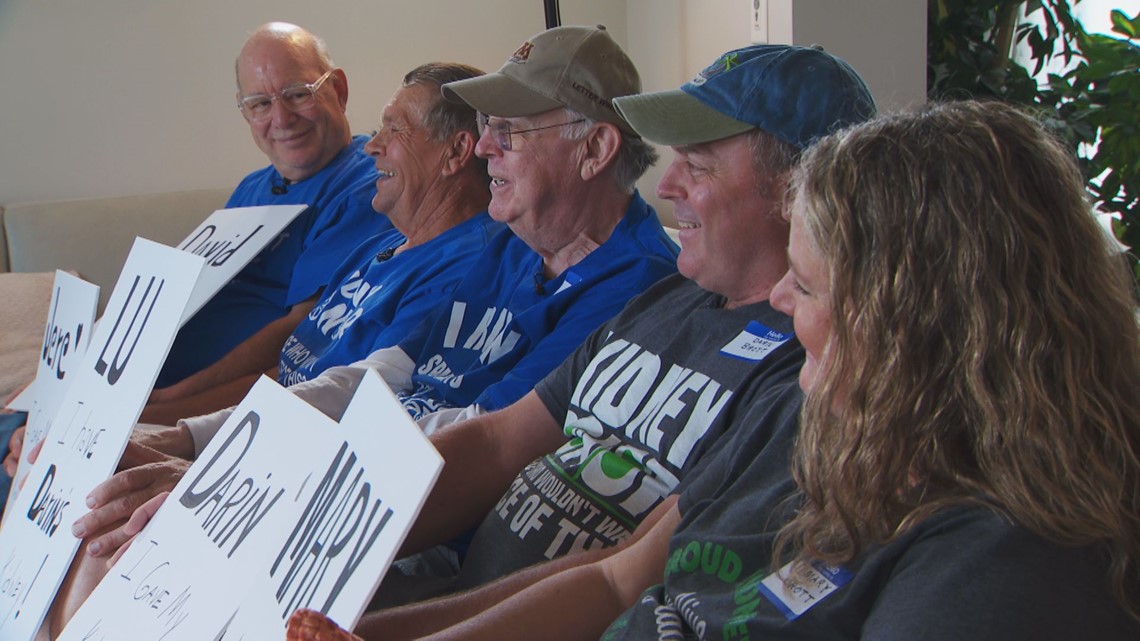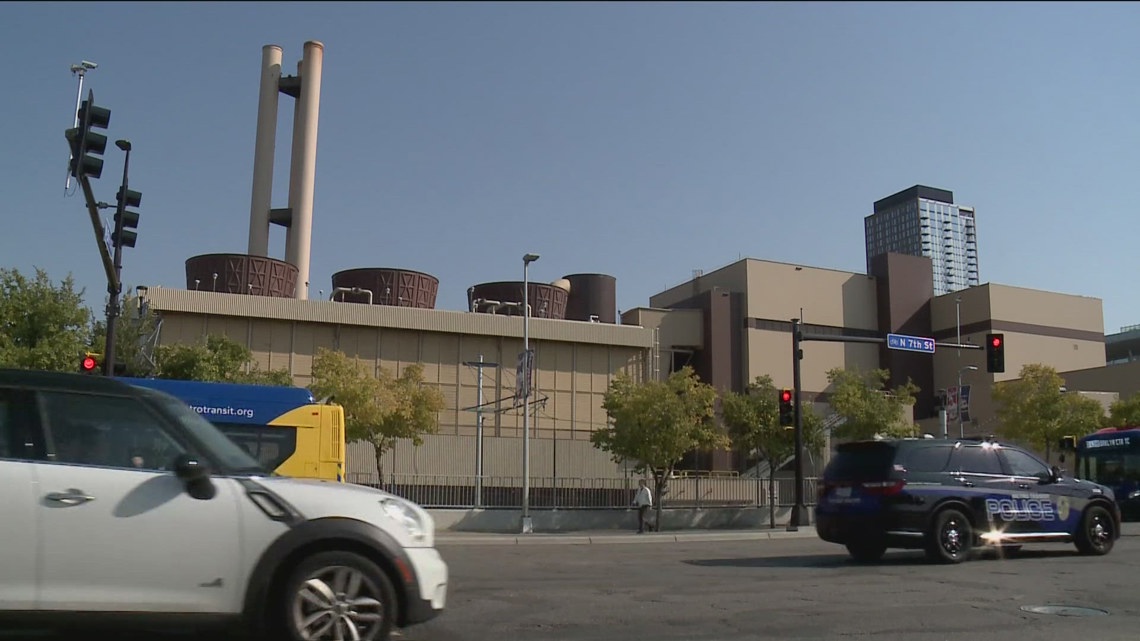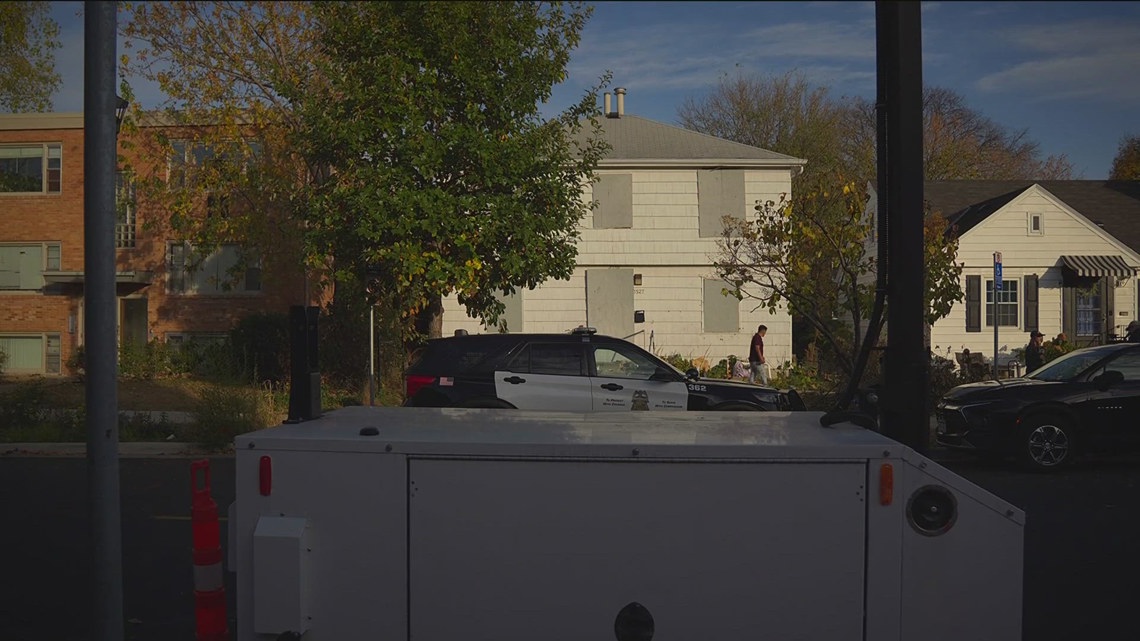Kare11
Chain of 5 has more in common than shared organs


Nowadays, you don’t need to be an exact match with a loved one to save them through organ donation.
MINNESOTA, USA — For the first time, a chain of five kidney donors and recipients are together in one room.
A growing trend of kidney organ donations made chains like this possible. If you want to give your kidney to a loved one, and aren’t a match, you can still give them an organ through paired exchange.
Lu Gronseth was one of the lucky recipients in the chain. He decided to bring everyone together for a “kidney party,” complete with a string of donors and recipients, and adorable organ-shaped cookies.
Gronseth needed a kidney after he was diagnosed with polycystic disease. His wife’s cousin, Jere, wanted to gift him one.
“I was reading devotions one day,” said Jere. “Everything you have is from the Lord. Your time, your talents and your body, everything you have. I called Lu to tell him I wanted to try. Turned out we were not a blood match.”
They learned about the paired organ exchange program through the University of Minnesota M Health Fairview. Essentially, a loved one can donate through paired exchange. They would give a kidney, and your loved one would get a different kidney.
Through a series of chance and letter writing, the five finally came together.
When Jere’s kidney was removed, it went to David Riley, who was on the edge of needing dialysis.
Jere’s loved one, Lu, received a kidney from Darin Brott, who was donating on behalf of his wife, Mary, who still doesn’t know who her kidney donor is.
“It’s amazing to finally put faces to my husband’s kidney,” said Mary. “We were just thankful we got to meet up with them.”
Mary was suffering from kidney failure. She said high blood pressure contributed to the health issues and received her transplant in June 2022.
“It’s such a blessing,” she said. “I just don’t take anything for granted. Just to be healthy again and live 20 plus more years. To enjoy trips and children, hopefully grandchildren some day. Just to live life again.”
Her husband, Darin, whose kidney ended up in Lu, said he didn’t realize the impact he would have on his recipient’s family.
“I just wanted to help my wife,” he said. “I realized that impact when I got my first letter from Lu. That was what woke me up. They sent us a video of their grandkids. That hit us hard too, because you’re affecting little kids.”
While Lu and Darin took months to connect via letter, Jere’s kidney recipient, David, found one another in near record time.
Jere and David had their surgeries on a Thursday. But Jere was determined not to miss his granddaughter’s basketball game the following Saturday.
“I didn’t tell the doctor I was going to a game,” he laughed.
He was sporting a shirt that day with the words “two kidneys are so last year.”
Another parent came up and introduced himself to Jere, telling him that he goes to church in the cities with a friend who received a kidney early Thursday morning.
He took a picture of Jere and sent it to his friend recovering in the hospital. Jere eventually contacted his transplant coordinator.
“She said this has never happened,” said Jere. “That is the gentleman that received your kidney. We’ve never had each other find one another so fast. I’ve also never had a patient crazy enough to go to a basketball game the day they leave the hospital.”
David Riley was without a willing donor. He was adopted and didn’t have any relatives and was hoping for a potential donor from a cadaver.
“I went through five possible donor kidneys,” he said.
Riley said he was called in and has gone as far as being prepped for different surgeries. For different reasons, doctors didn’t think any of them would be a healthy fit.
“I feel like I have a longer runway now of life,” said Riley. “I want to make sure I accomplish things and make it worth Jere’s time.”
M Health Fairview University of Minnesota handled three out of the five surgeries in the chain.
“In the past, you had to go out and find a person who matches you,” said Dr. Raja Kandaswamy, a professor of surgery and director of kidney transplant. “As long as they get a healthy donor volunteering to donate to them, that person can donate into what’s called a kidney registry. And then the registry will find something back for the recipient that’s appropriate.”
Kandaswamy said this helps recipients get better matches and if a donor is so inclined, they can get a family voucher if a loved one ever needs a kidney in their lifeline.
He calls it “organ insurance.”
Kandaswamy said kidneys are the main organ for paired donation because of the larger pool of donors. It happens with liver transplants, too. Lately, Kandaswamy and his team have been using what he called molecular level matching.
“In the past, we did blood type matching, we did tissue type matching,” he said. “With molecular matching, the outcomes are better.”
According to Kandaswamy, only 10 percent of transplants were being paired in 2010 when the center started participating in paired exchange.
Now, about 70 percent of the center’s transplants are paired transplants with the rest of the patients receiving kidneys through direct donation.
“In the past, these were blood relations,” said Dr. Karthik Ramanathan, an assistant professor of transplant surgery at the University of Minnesota. “This sort of gives it a whole new meaning to family. This is really done in the name of being able to help someone without really limiting your options and being able to help multiple people in ways that we weren’t able to do before.”
Lu said he also owes a debt of gratitude to Jere, who donated his kidney on Lu’s behalf. His illness, PKD, is hereditary.
“My mother was on dialysis, inherited polycystic kidney disease,” said Lu. “Back then, transplants weren’t nearly the option that they are today. She voluntarily quit going and then at that point we knew she had two weeks left and that’s how long you can live without dialysis, you know.”
Lu’s son, Troy Gronseth, has also inherited the disease.
“It was a little preview for myself,” said Troy. “To watch my dad go through this process. It means our kids will get to know their grandpa.”
“I hope Troy has a Jere in his life,” said Lu.
David and Jere no refer to themselves as “kidney brothers” and talk on the phone weekly. Mary said she has written her potential donor and hopes they respond and can be welcomed to the next “kidney party.” Darin and Lu have spent hours halfway in Wisconsin.
“We spent hours in Culver’s that day,” said Lu. “They started charging us rent.”
The story on how these five came together may be a confusing one. But the decision behind it is simple enough to understand.
“We get to give someone a longer life,” said Jere. “I could never do anything better than this.”
Watch the latest local news from the Twin Cities and across Minnesota in our YouTube playlist:
WATCH MORE ON KARE 11+
Download the free KARE 11+ app for Roku, Fire TV, Apple TV and other smart TV platforms to watch more from KARE 11 anytime! The KARE 11+ app includes live streams of all of KARE 11’s newscasts. You’ll also find on-demand replays of newscasts; the latest from KARE 11 Investigates, Breaking the News and the Land of 10,000 Stories; exclusive programs like Verify and HeartThreads; and Minnesota sports talk from our partners at Locked On Minnesota.
Kare11
Minneapolis City Council votes to shut down HERC permanently


The council argues that the HERC must be closed to comply with the city’s zero waste policy, which was passed back in 2017.
MINNEAPOLIS — The Minneapolis City Council unanimously approved a plan to shut down the Hennepin Energy Recovery Center (HERC) on Thursday.
The resolution comes after decades of protests against the massive North Loop trash incinerator that burns roughly 365,000 tons of garbage a year.
“Today is a big step towards protecting the health of our communities and addressing longstanding environmental injustices that disproportionately impact communities of color,” said councilmember Robin Wonsley, in a statement.
The resolution calls for the incinerator to be permanently closed by Dec 31, 2027 and for the entire facility to be shut down by Dec 31, 2033.
The council argues that the HERC must be closed to comply with the city’s zero waste policy, which was passed back in 2017.
In October 2023, the Hennepin County Board signed off on a plan to close the HERC between 2028 and 2040, depending on how quickly the county can transition into a zero-waste system.
Of the garbage burned at the HERC, 75% comes from the city of Minneapolis. The other 25% comes from a dozen other cities in the area. The HERC produces enough energy to power more than 25,000 homes and half the buildings in downtown Minneapolis.
At a City Council Meeting on Oct. 10, Jenni Lansing with the City of Minneapolis Health Department provided analysis on the air pollution impacts of HERC. She said the health department supports working towards a zero-waste future and the ultimate closure of HERC, but said closing it now is not the solution.
“Overall emissions in Hennepin County are dominated by on-road and non-road, mobile and nonpoint sources, and these sources drive the cancer and non-cancer risks to health in Minneapolis,” Lansing said.
Hennepin County defines zero waste as preventing 90% or more of all discarded materials from being landfilled or incinerated.
This is a developing story and will be updated as more information becomes available.
Kare11
Halloween storm knocks out power and spins cars into ditches


The snow is really coming down in some places with Maple Lake getting 3.5″ so far.
GOLDEN VALLEY, Minn. — The wettest Halloween storm ever — is making mischief before little trick-or-treaters hit their neighborhood’s slushy streets.
Officials are reporting several power outages and car spin-outs.
There have been over 14,000 power outages, according to Xcel Energy.
The Minnesota State Patrol has responded to 169 crashes and 94 vehicles off the road, as of 2. pm. Thursday.
Meteorologist Beny Dery said an additional 1 to 2″ of snow is possible before things taper off this evening.
So far some of the totals around town are: 3.5″ Maple Lake, 3.0″ Buffalo, 2.5″ Dassel, 2.4″ Windom, 2.0″ St. Bonifacious, 1.5″ Maple Plain and 1.5″ in Bethel.
The snow is expected to let up from west to east and should wrap up for the metro between 5 to 6 p.m.
Kare11
Minneapolis shooting prompts City Council to request audit


Last week, prosecutors charged John Sawchak with attempted 2nd-degree murder and other felony charges after he allegedly shot his neighbor Davis Moturi.
MINNEAPOLIS — Following the shooting between two neighbors, the Minneapolis City Council voted unanimously to request that the city’s auditor conduct an independent investigation into the incidents and cases between Davis Moturi and John Sawchak.
Moturi was allegedly shot by his neighbor, Sawchak, on Wednesday, Oct. 23 but Minneapolis police did not arrest Sawchak until days later.
Minneapolis Police Chief Brian O’Hara defended not arresting Sawchak sooner, calling it a “high-risk” situation. O’Hara later said the victim, who had complained about harassment from Sawchak for months, was failed by police. Sawchak was arrested this past weekend after an hours-long standoff.
Moturi suffered a fractured spine, two broken ribs, and a concussion in the shooting. “Mr. Moturi’s life matters and I’m sorry that for nearly a year, MPD did not treat it like it did,” said Council Member Robin Wonsley in a news release, “Today’s vote affirms that the City Council is committed to taking meaningful actions towards accountability and restoration, starting with this independent review.”
Meanwhile, a spokesperson for Minneapolis Mayor Jacob Frey released this statement:
“Mayor Frey fully supports an independent review of this incident. The mayor and City are committed to always doing better, and this means closely examining past actions and finding where there may be ways to improve and grow. The mayor extends his condolences to Davis Moturi, his wife, Caroline, and their family and friends. The safety of our residents is a top priority and any form of violence or hate speech is completely unacceptable and does not align with who we are as a community. Brian O’Hara will continue to be the Minneapolis Police Chief.”


